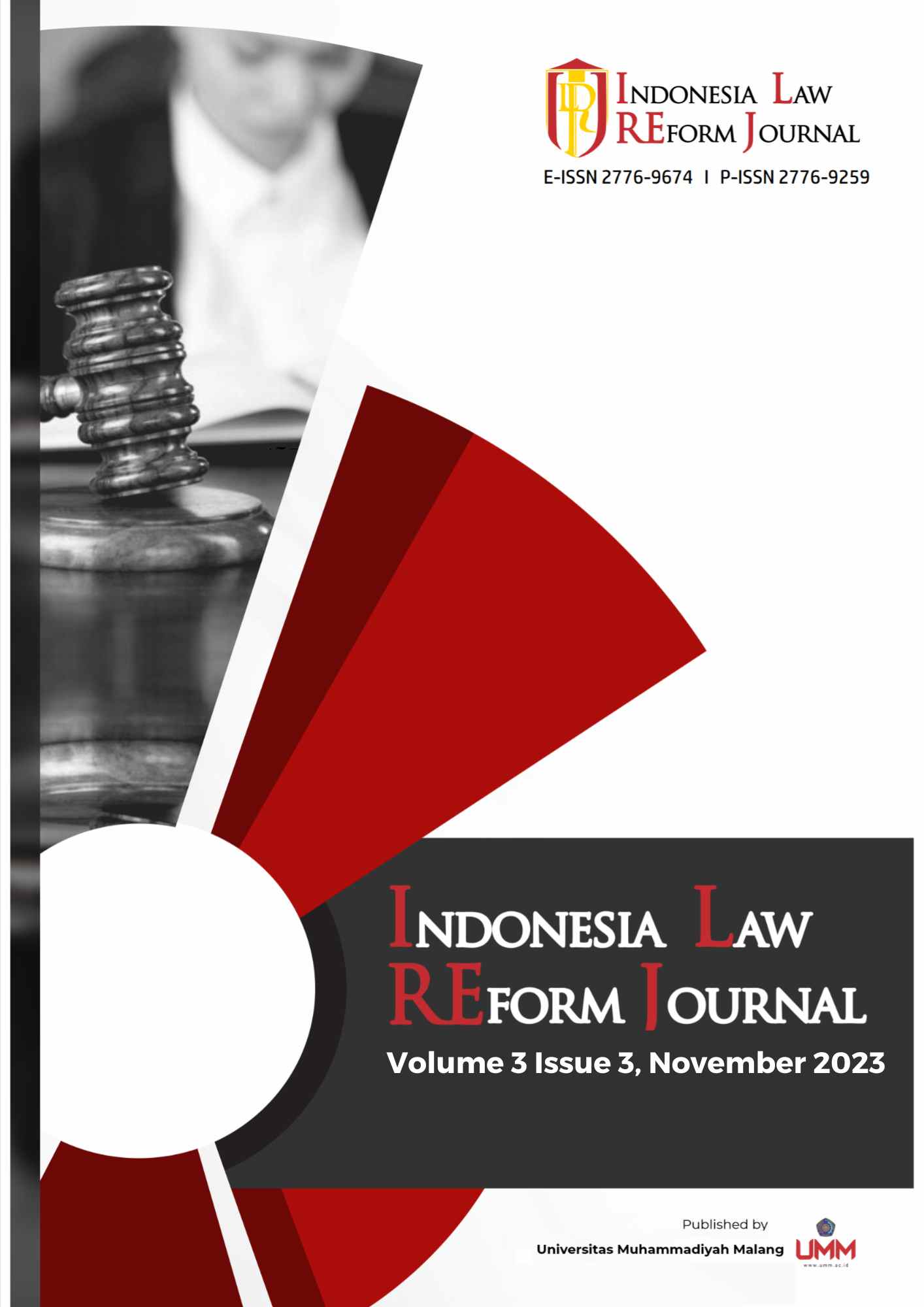Protecting the Land Tenure Rights of Papuan Indigenous Peoples After New Autonomy Region
DOI:
https://doi.org/10.22219/ilrej.v3i3.31352Keywords:
Indigenous Peoples, New Authonomy Areas, Papua, Socio-LegalAbstract
The issues with indigenous peoples are very frequent, the impact of development, investment, and deforestation is accompanied by land conversion activities for oil palm plantations and mining, making the rights of indigenous peoples marginalized. In this context, this study seeks to investigate: (1). What problems are experienced by the Papuan Indigenous Peoples and what protection should be accepted by legal and human rights approaches? (2) What are the challenges of Special Autonomy in Papua following the stipulation of the latest Special Autonomy Law, especially in Southwest Papua, and what kind of projections and challenges are needed to protect the Papuan people at large? This research uses socio-legal methods to identify legal procedures related to socio-cultural and political-economic aspects of the Papuan community. The result of this study shows that several points are specified to protect Indigenous Peoples rights in Papua, especially after Special Autonomy, namely the importance of protecting the human rights of Indigenous Peoples related to the right to self-determination, recognition of adat rights, and basic rights that should have affirmative policies carried out by the state to ensure that Indigenous Peoples can play a major role in protecting the environment and contributing to climate change prevention. Investment or state authority must be limited to protect, promote, and respect Indigenous Peoples in Papua and also Southwest Papuans. Then, with regard to the DOB in Papua, of course, it must be returned to its noble goal of protecting the rights of the Papuan people in realizing welfare and independence. Abuse of various forms of authority, including special autonomy funds in Papua must be condemned and strictly processed.
Abstrak
Problematika terhadap masyarakat adat sangat sering terjadi, dampak pembangunan, investasi, deforestasi disertai dengan aktivitas alih-fungsi lahan untuk perkebunan kelapa sawit dan pertambangan, menjadikan hak-hak masyarakat hukum adat menjadi tersingkirkan. Pada konteks ini kita perlu mengidentifikasi lebih dalam: (1). Bagaimana problematika yang dialami MHA Papua dan perlindungan yang harusnya diterima pendekatan hukum dan HAM; (2). Bagaimana tantangan Otsus Papua pasca UU Otsus terbaru, khususnya di Papua Barat Daya, proyeksi dan tantangan seperti apa yang dibutuhkan untuk melindungi masyarakat Papua secara luas. Penelitian ini menggunakan metode sosio-legal untuk mengidentifikasi prosedur hukum serta lebih dari itu berkaitan dengan aspek sosio-kultur, dan politik-ekonomi masyarakat Papua. Hasil penelitian ini adalahsetidaknya ada beberapa point untuk melindungi hak MHA di Papua khususnya pasca Otsus, yaitu pentingnya melidungi hak asasi dari MHA, berkaitan dengan hak menentukan nasibnya sendiri, pengakuan terhadap hak ulayat, serta hak-hak dasar yang harusnya ada kebijakan afirmatif yang dilakukan oleh negara untuk meastikan bahwa MHA dapat menjalankan peran besarnya dalam melindungi lingkungan hidup serta berkontribusi terhadap pencegahan perubahan iklim. Atas nama investasi atau otoritas negara yang berlebih, harus dibatasi dalam rangka perlindungan, pemajuan, dan penghormatan terhadap MHA, khususnya MHA di Papua. Kemudian, berkaitan dengan DOB di Papua termasuk di Papua Barat Daya, tentu harus dikembalikan kepada tujuan mulianya untuk melindungi hak masyarakat Papua dalam mewujudkan kesejahteraan dan kemandirian.
Downloads
References
Aditya, Zaka Firma, and Sholahuddin Al-Fatih. “The Legal Protection System of Indigenous Peoples in Southeast Asia.” Legality : Jurnal Ilmiah Hukum 31, no. 2 (September 21, 2023): 285–309. https://doi.org/10.22219/ljih.v31i2.27619.
AMAN. “ALIANSI MASYARAKAT ADAT NUSANTARA.” www.aman.or.id, 2022.
———. “Mengarungi Badai Investasi: Catatan Akhir Tahun 2019 Aliansi Masyarakat Adat Nusantara,” 2019.
Aritenang, Adiwan F. “The Effect of Intergovernmental Transfers on Infrastructure Spending in Indonesia.” Journal of the Asia Pacific Economy 25, no. 3 (2020). https://doi.org/10.1080/13547860.2019.1675352.
Asshiddiqie, Jimly. Konsolidasi Naskah UUD 1945. Yarsif Watampone, 2003.
Barelli, Mauro. “Free, Prior and Informed Consent in the Aftermath of the UN Declaration on the Rights of Indigenous Peoples: Developments and Challenges Ahead.” The International Journal of Human Rights 16, no. 1 (January 2012): 1–24. https://doi.org/10.1080/13642987.2011.597746.
Barnes, Paul A., Sabhrina Gita Aninta, Tomi Ariyanto, Mukhlish Jamal Musa Holle, M. Khairul Ikhawan, and Herdhanu Jayanto. “The Gap between Policy and Practice for Human Rights in Conservation: A Case Study in Papua Province, Indonesia.” Oryx 57, no. 3 (May 9, 2023): 360–69. https://doi.org/10.1017/S0030605323000066.
Bartlett, Judith G, Lucia Madariaga-Vignudo, John D O’Neil, and Harriet V Kuhnlein. “Identifying Indigenous Peoples for Health Research in a Global Context: A Review of Perspectives and Challenges.” International Journal of Circumpolar Health 66, no. 4 (September 1, 2007): 287–370. https://doi.org/10.3402/ijch.v66i4.18270.
Boillat, Sébastien, M. Graziano Ceddia, and Patrick Bottazzi. “The Role of Protected Areas and Land Tenure Regimes on Forest Loss in Bolivia: Accounting for Spatial Spillovers.” Global Environmental Change 76 (September 2022): 102571. https://doi.org/10.1016/j.gloenvcha.2022.102571.
Broberg, Morten. “Parametric Loss and Damage Insurance Schemes as a Means to Enhance Climate Change Resilience in Developing Countries.” Climate Policy 20, no. 6 (July 2, 2020): 693–703. https://doi.org/10.1080/14693062.2019.1641461.
Cambou, Dorothée. “The UNDRIP and the Legal Significance of the Right of Indigenous Peoples to Self-Determination: A Human Rights Approach with a Multidimensional Perspective.” The International Journal of Human Rights 23, no. 1–2 (February 7, 2019): 34–50. https://doi.org/10.1080/13642987.2019.1585345.
Carpenter, Kristen, and Alexey Tsykarev. “Indigenous Peoples and Diplomacy on the World Stage.” In AJIL Unbound, Vol. 115, 2021. https://doi.org/10.1017/aju.2021.7.
Charters, Claire. “The Sweet Spot between Formalism and Fairness: Indigenous Peoples’ Contribution to International Law.” SSRN Electronic Journal, 2021. https://doi.org/10.2139/ssrn.3839826.
Djojosoekarto, Agung. Kinerja Otonomi Khusus Papua. KITLV, 2014.
Ginsburg, Chloe, and Stephanie Keene. “At a Crossroads: Consequential Trends in Recognition of Community-Based Forest Tenure from 2002-2017.” China Economic Journal 13, no. 2 (2020). https://doi.org/10.1080/17538963.2020.1755129.
Herlambang P Wiratraman, Agung Wibowo, Erasmus Cahyadi, Syahrul Fitra B. “PANDANGAN HUKUM HUTAN ADAT PAPUA DAN PAPUA BARAT, Perkumpulan Untuk Pembaharuan Hukum Berbasis Masyarakat Dan Ekologis (HuMa),” 2018.
Inguanzo, Isabel. “Paths to Recognition: Explaining Indigenous Peoples’ Rights in Southeast Asia through Qualitative Comparative Analysis (QCA).” Philippine Political Science Journal 39, no. 1 (2018). https://doi.org/10.1080/01154451.2018.1512256.
Konsorsium Pembaruan Agraria. “MASA DEPAN REFORMA AGRARIA MELAMPAUI TAHUN POLITIK,” 2018.
KPA. “Catatan Akhir Tahun 2020 Konsorsium Pembaruan Agraria (KPA).” 2020.
Kunz, Yvonne, Stefanie Steinebach, Christoph Dittrich, Brigitta Hauser-Schäublin, Ir. Rosyani, Endriatmo Soetarto, and Heiko Faust. “‘The Fridge in the Forest’: Historical Trajectories of Land Tenure Regulations Fostering Landscape Transformation in Jambi Province, Sumatra, Indonesia.” Forest Policy and Economics 81 (August 2017): 1–9. https://doi.org/10.1016/j.forpol.2017.04.005.
Lele, Gabriel. “Asymmetric Decentralization, Accommodation and Separatist Conflict: Lessons from Aceh and Papua, Indonesia.” Territory, Politics, Governance 11, no. 5 (2023). https://doi.org/10.1080/21622671.2021.1875036.
Nagy, Rosemary. “Transformative Justice in a Settler Colonial Transition: Implementing the UN Declaration on the Rights of Indigenous Peoples in Canada.” The International Journal of Human Rights 26, no. 2 (February 7, 2022): 191–216. https://doi.org/10.1080/13642987.2021.1910809.
Osakada, Yuko. “An Examination of Arguments over the Ainu Policy Promotion Act of Japan Based on the UN Declaration on the Rights of Indigenous Peoples.” The International Journal of Human Rights 25, no. 6 (July 3, 2021): 1053–69. https://doi.org/10.1080/13642987.2020.1811692.
Puig, Sergio. “Indigenous Peoples under International Economic Law.” In At the Margins of Globalization, 2021. https://doi.org/10.1017/9781108596503.005.
Resosudarmo, Ida Aju Pradnja, Stibniati Atmadja, Andini Desita Ekaputri, Dian Y. Intarini, Yayan Indriatmoko, and Pangestuti Astri. “Does Tenure Security Lead to REDD+ Project Effectiveness? Reflections from Five Emerging Sites in Indonesia.” World Development 55 (March 2014): 68–83. https://doi.org/10.1016/j.worlddev.2013.01.015.
Riggs, Rebecca Anne, Jeffrey Sayer, Chris Margules, Agni Klintuni Boedhihartono, James Douglas Langston, and Hari Sutanto. “Forest Tenure and Conflict in Indonesia: Contested Rights in Rempek Village, Lombok.” Land Use Policy 57 (November 2016): 241–49. https://doi.org/10.1016/j.landusepol.2016.06.002.
Robet, Robertus, Meila Riskia Fitri, and Marista Christina Shally Kabelen. “The State and Human Rights under Joko Widodo’s Indonesia.” Cogent Social Sciences 9, no. 2 (December 2023): 2286041. https://doi.org/10.1080/23311886.2023.2286041.
Savitri, Laksmi A. “Rentang Batas Dari Rekognisi Hutan Adat Dalam Kepengaturan Neoliberal.” Jurnal Wacana Nomor 33 (2014): 61–98.
Sekretariat Negara, R I. “Risalah Sidang BPUPKI PPKI 28 Mei 1945–22 Agustus 1945.” Sekretariat Negara Republik Indonesia, Jakarta, 1995.
Soetjipto, Ani Widyani. “Journey to Justice: The United Nations Declaration on the Rights of Indigenous Peoples in the Context of West Papua.” JAS (Journal of ASEAN Studies) 10, no. 1 (August 12, 2022). https://doi.org/10.21512/jas.v10i1.8491.
South, Nigel. “Green Criminology : Reflections, Connections, Horizons.” International Journal for Crime, Justice and Social Democracy 3, no. 2 (January 1, 2014): 6–21. https://search.informit.org/doi/10.3316/agispt.20142518.
Suryawan, I Ngurah. “‘Komin Tipu Komin’: Elit Lokal Dalam Dinamika Otonomi Khusus Dan Pemekaran Daerah Di Papua.” Jurnal Ilmu Sosial Dan Ilmu Politik 15, no. 2 (2011): 140–53. https://doi.org/10.22146/jsp.11390.
Tamanaha, Brian Z. Realistic Socio-Legal Theory: Pragmatism and a Social Theory of Law. Oxford university press, 1997.
Tomsa, Dirk, and Narissa Bax. “Democratic Regression and Environmental Politics in Indonesia.” Asian Studies Review 47, no. 4 (2023). https://doi.org/10.1080/10357823.2023.2189690.
Wignjosoebroto, S. Pokok-Pokok Pikiran Tentang Empat Syarat Pengakuan Eksistensi Masyarakat Adat Dalam Inventarisasi Dan Perlindungan Hak Masyarakat Hukum Adat. Jakarta: Komisi Nasional Hak Asasi Manusia, 2005.
Williams, Jay. “The Impact of Climate Change on Indigenous People - the Implications for the Cultural, Spiritual, Economic and Legal Rights of Indigenous People.” International Journal of Human Rights 16, no. 4 (2012). https://doi.org/10.1080/13642987.2011.632135.
Williams, Terry, and Preston Hardison. “Culture, Law, Risk and Governance: Contexts of Traditional Knowledge in Climate Change Adaptation.” Climatic Change 120, no. 3 (October 15, 2013): 531–44. https://doi.org/10.1007/s10584-013-0850-0.
Wiratraman, Herlambang Perdana, and Widodo Dwi Putro. “Tantangan Metode Penelitian Interdisipliner Dalam Pendidikan Hukum Indonesia.” Mimbar Hukum - Fakultas Hukum Universitas Gadjah Mada 31, no. 3 (January 29, 2020): 402. https://doi.org/10.22146/jmh.44305.
Woodman, Connor. “The West Papuan Liberation Movement, Indonesian Settler Colonialism and Western Imperialism from an International Solidarity Perspective.” International Journal of Human Rights 27, no. 6 (2023). https://doi.org/10.1080/13642987.2022.2132235.
XANTHAKI, Alexandra. “Indigenous Rights in International Law over the Last 10 Years and Future Developments.” Melbourne Journal of International Law 10, no. 1 (May 1, 2009): 27–37. https://search.informit.org/doi/10.3316/agis_archive.20093267.
Downloads
Published
How to Cite
Issue
Section
License
Copyright (c) 2023 Satria Unggul Wicaksana Prakasa, A. Sakti R.S. Rakia, Izawati Wook

This work is licensed under a Creative Commons Attribution-ShareAlike 4.0 International License.











